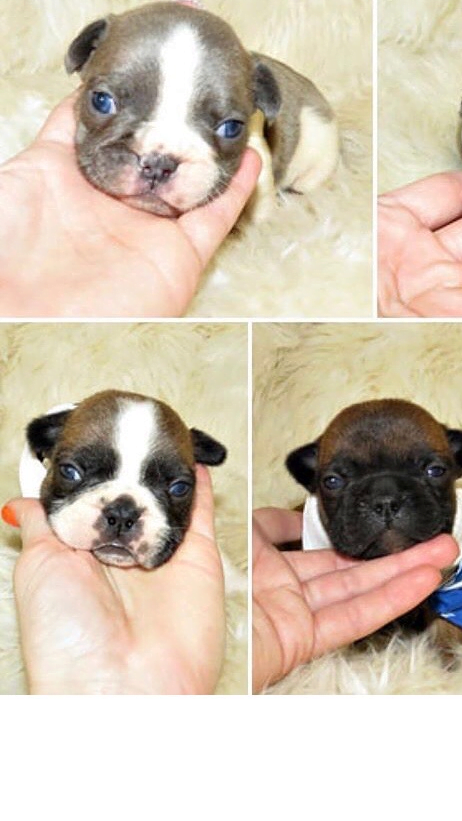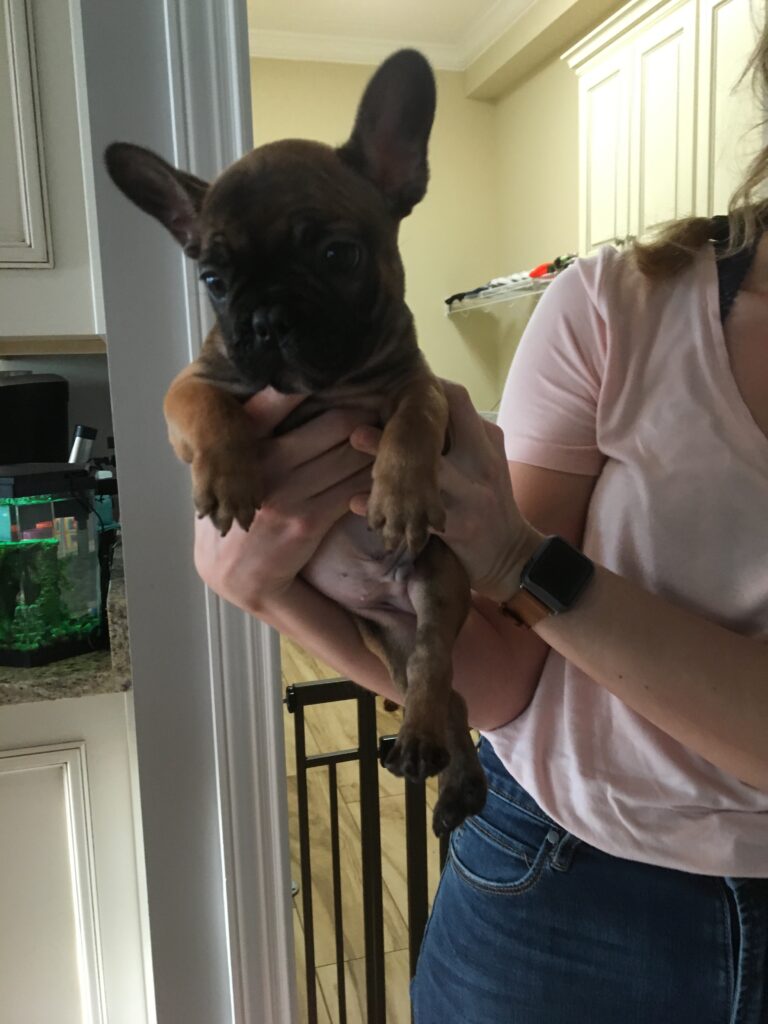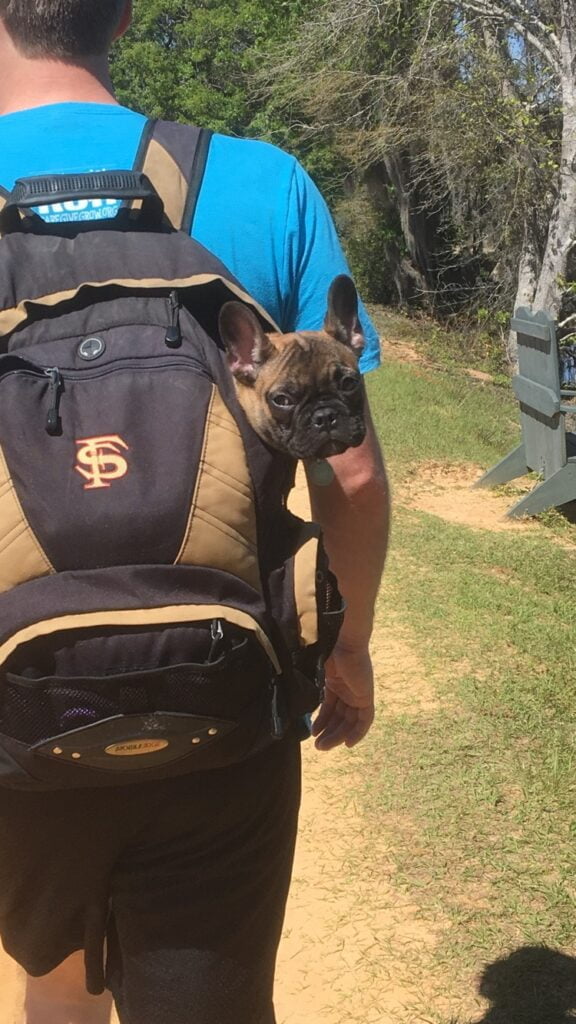It’s an exciting time when you’re ready for a new furry family member! There’s a lot to do when preparing to get a French Bulldog, including preparing for questions to ask a dog breeder when you’re ready to pick the perfect Frenchie for you and your family.
Why You Need to be Picky About Your French Bulldog Breeder
Picking a dog breeder is almost as important as picking your new pup. Wherever you get your new Frenchie, you should always pay attention to a number of things.
If there are some things that aren’t done accordingly or questions that can’t be answered, it may be best to move on and seek out another breeder.
I imagine we all prefer to take a pet home who was carefully and thoughtfully bred and is happy and healthy. Not all breeders are established and have Frenchies that have up-to-par health and behavior.
And the good news is you don’t pay any more when purchasing from an established breeder than you do from pet shops or backyard breeders. Sometimes you even pay less when purchasing from an appropriate breeder.
As quickly as you likely want to bring your new French Bulldog home, it’s crucial to select the right breeder. Selecting the right breeder requires you to pay attention to the behavior (of the animals and breeder alike), the dog’s health, and the way the animals are bred. You can do this by knowing the appropriate questions to ask a dog breeder listed below.

Questions to Consider or Ask a French Bulldog Breeder
When you are making such a big and important decision- purchasing a new French Bulldog to add to your family and care for forever- you have every right to be careful and know all there is to know. There are a number of factors to consider when visiting new Frenchies and questions to ask the dog breeder.
A responsible breeder will be more than happy to answer any and all questions. If they don’t appear to be able to, your best bet is to find a different breeder.
The following is by no means the only questions there are to ask, but they are important ones:
How many litters are present?
A breeder has to put a lot of time and energy into guiding and caring for the puppies. If a breeder is caring for many litters, they will start to cut corners and not be able to put in as much effort to care for your future pup.
A breeder who is seriously engaged in socialization does not have several litters at once. If a breeder does have several litters, they should have a staff who is consciously and systematically involved in the socialization of the puppies.
Is the mother dog present?
It is very important that the mother dog is present with her puppies. The behavior of the mother gives you information about the puppies.
Moreover, it is very important for the education of the puppies that they learn everything from their mother. She teaches them how to behave, that they should not bite too hard, and what dog behavior looks like.
Puppies can, in fact, leave their mother after seven weeks. However, for the best-case scenario, you should not buy a Frenchie from a breeder who doesn’t have the mother present.
Watch how the mother dog behaves. A mother dog with a litter of Frenchie puppies can sometimes be a bit protective against strangers who come to her puppies but may not react aggressively or anxiously to your arrival. Also, be aware of how the mother looks. Is she a healthy weight? Is she clean?

Is the litter located inside the house?
Puppies grow up best under domestic conditions. Growing up inside of a home allows the dog to get used to what it will encounter in its later life as a domestic dog.
If a dog begins their life inside, they will likely adapt pretty well to your home. This is especially important for a family who doesn’t have an abundance of time to train a new dog.
If you’re looking at a Frenchie who’s already been living inside its breeder home, the dog should already be used to people walking around, visitors, possibly other pets, and to domestic noises.
Many home breeders or pet shops keep dogs outside, in a kennel or shed. Research shows that there are quite a few benefits of dogs growing up inside of the home, including less aggression and anxiety and easier training.
Is it clean?
Of course, it is important that the environment where the puppies stay is kept clean. This is not only necessary from a hygienic point of view but also in connection with education.
Dogs that grow up in their own rubbish are often improperly potty trained. A good breeder potty trains their dogs and ensures the dogs sleeping quarters are kept clean.

How do the puppies respond to visitors?
Pups that are used to people should not respond too anxiously to visitors. If the puppies crawl away when you come to watch, this isn’t the best sign. While some dogs are naturally more anxious, a healthy, social, and human-friendly dog will come to greet you and be curious about you, even if it takes some time.
It should be noted that different breeds have different temperaments, especially when meeting someone new. French Bulldogs are quite social and are not typically shy to new people.
Very young puppies of about three weeks may not come directly to you, but older Frenchies are usually in their discovery and socialization period. A seven or eight-week-old puppy that shows fear when meeting you probably has not had ample socialization. They could also be anxious by nature.
How do the puppies respond to sounds?
A well-socialized puppy should not be too shocked by normal house noises, such as the closing of a door or the sound of the telephone. If the sounds are unknown, the puppies may be shocked, but they should recover quickly and continue to play, sleep, or investigate the source of the noise.
Do the puppies have a vaccination certificate?
Puppies should be vaccinated at least once against the common diseases before they go to their new owner (including Distemper, Parvovirus, Rabies, CAV-2, Leptospirosis, Canine parainfluenza). They should also be dewormed. The vaccination schedule will be at the discretion of the vet.
The breeder should have a vaccination certificate or record from the vet. A breeder should happily provide you with this information.
Have the parent animals been tested for hereditary defects and are there official documents?
In dogs, hereditary disorders can occur, such as, for example, joint disorders (such as hip or elbow dysplasia, patellar luxation, or OCD) or eye disorders (such as PRA, cataract).
French Bulldogs in particular often suffer from different health issues. It’s important for you to know what these could be to prepare for this discussion with the breeder.
It is important that this is taken into account when breeding in order to reduce the condition. Breeding clubs usually oblige their members to have parents tested for these conditions.
Parents who exhibit a certain degree of the disorder are generally excluded from breeding. This is to reduce the chance that new puppies will have these hereditary conditions.
When asking a breeder about hereditary defects, they should be able and willing to show you official results. You can also ask your vet or the breed club for further explanation and advice about the results of hereditary tests.
There are no tests for every condition, so ask about the health of the parents.
Does the breeder provide clear information and also ask questions?
Not only should you have questions to ask a dog breeder, but they should also be interested in asking you some, too.
A good breeder wants his puppies to find a suitable new owner. The breeder should ask you questions about your situation and seem interested in learning if you are a fit owner for the dog you are interested in.
The breeder should also be ready and willing to give you a full run-down of the Frenchie you are interested in- the good, the bad, and the ugly. After all, the breeder should want you to be certain that the dog you are choosing is a good, long-term fit for you.
A good breeder is concerned with the welfare of the puppies and will do their best to make the transition to another home go as smoothly as possible.
That means that you get information about how to deal with the puppy for the first time, and what to look out for, often you get food and a cloth or toy that smells like the litter.
The breeder should encourage you to contact them after purchasing your new dog if needed.
If you don’t receive detailed information and get the impression that the breeder is only interested in closing the deal and that they are not interested in where the puppy is going, it’s a tell-tale sign that you need to move on and find a better breeder.
Does the process seem rushed?
If you are looking at a Frenchie and you feel rushed due to several people also looking or the breeder trying to close the deal, then move on. You should feel like you can carefully make a decision, revisit if needed, and ask plenty of questions.
A breeder should never tell a potential Frenchie parent that they cannot come back to revisit and that you need to purchase now.

Is there a clear purchase contract?
To be able to prove that a dog is yours, you must be able to show proof of purchase. In addition, it is very wise to ask for a real purchase contract that clearly states the rights and obligations of the buyer and seller.
It’s crucial to be certain that the dog is officially considered your “property” and not that you are simply a ‘foster parent’ and the breeder remains the owner.
It may also be that the contract states that you must not allow the dog to be neutered, that you must make the dog available for breeding, or that you are not allowed to breed with it. Thoroughly read the contract and be certain that there are no stipulations you don’t agree with.
When in Doubt, Keep Looking
Usually, when we decide it’s time for a new furry family member, we want to wake up tomorrow cuddling our adorable, new Frenchie. For the best outcome for you and the dog, it’s detrimental to take your time visiting a breeder and considering and asking these very important questions.
At times a breeder may be able to answer all of the questions with no problem, but you still don’t feel right. This is okay. If ever in doubt, you should not buy.
This is a huge decision that you are making for yourself, your family, and a dog. It should not be taken lightly.
Once you pick your new furry family member, it’s time for the fun stuff: feeding it the good stuff, going on walks, and playing together. This makes all the work worth it!
